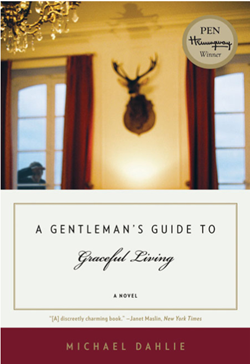A Gentleman’s Guide to Graceful Living
by Michael Dahlie
reviewed by David James Poissant
In A Gentleman’s Guide to Graceful Living, author Michael Dahlie gives us Arthur Camden, the bumbling, sixty-something hero of this measured, sometimes dark, and often funny debut novel in four parts.
Newly divorced and still reeling from the collapse of his business, Arthur is his own worst enemy. As the novel opens, Arthur breaks a cardinal rule of the Hanover Street Fly Casters. He sneaks a woman into Maidenhead Grange, the camp of his exclusive fishing club. Then he accidentally burns the place down. This is the first in a series of wrong turns for Arthur. He deceives police to cover for an alcoholic friend who has, in all likelihood, abused his ex-wife and children. He pockets a priceless family heirloom that belongs to a cousin. And he sleeps with Rebecca, the woman to whom he was married for thirty-two years before she “left him for a former boyfriend she had not seen since she was seventeen,” and who cheated on him mercilessly while they were married.
Despite his recklessness, however, it’s hard not to feel an affinity for Arthur Camden. He has the wealth and intelligence of a Jay Gatsby, yet he stumbles through his days with the awkwardness of a Willy Loman. Like Loman, Arthur is neither well-liked nor respected by his colleagues and family. After admitting to the fishing camp fire, he comes to the conclusion that “dignity seems to be the very thing that I lack most in this world,” and in order to preserve what little he has left, Arthur resigns his club membership and flees the country. The novel then becomes picaresque, Dahlie drawing on all of the elements of that mode. The structure is episodic, the tone often satiric, as our rogue embarks on a succession of adventures. As errant hero, Arthur sets off on a quest to recapture some essence of “graceful living,” and his travels take him everywhere from faraway France to nearby Nantucket, with a brief stay in Switzerland in between.
Recognizing that he has a habit of running from his problems, Arthur decides to tackle one head on. In part three, arguably the novel’s funniest, most engaging section, Arthur attends a family gathering. There, he encounters Bill Ellis, cousin and owner of a coveted Kolodzei Signal wristwatch which had once belonged to Arthur’s father. Reclaiming what he believes is rightfully his, Arthur steals the watch, only to be discovered when the alarm sounds from inside his suitcase. Faced with the prospect of coming clean and forever embarrassing himself before his family, he runs away once more, and it is this act that sets the novel’s last episode in motion.
The careful reader of A Gentleman’s Guide to Graceful Living will likely enjoy not only the elaborate characterization of the endearing Arthur Camden, but also the ways in which Dahlie draws him atypically. Unlike fellow Manhattan blue bloods of contemporary American fiction, Arthur is, refreshingly, “not a big drinker.” He is also no lothario (when Arthur, who was faithful to his wife in marriage and abstinent in the year following his divorce, happens upon two people having sex, he is mortified by his incursion into their “carnal activities”). Introspective, brainy, and repressed, Dahlie’s protagonist resembles less his literary forebears and more the characters of recent darkly comic films from Wes Anderson, Noah Baumbach, and Alexander Payne. Like Schmidt from Payne’s adaptation of Louis Begley’s novel About Schmidt, another picaresque adventure, Arthur is big-hearted but clueless. He is a man who could make something of himself if only he’d stop getting in his own way, a hero who reminds the reader that it’s never too late to start your life over.
In the end, the reader is more than rewarded for joining Arthur on his journey. A Gentleman’s Guide to Graceful Living is a debut novel well worth reading, and Michael Dahlie is indisputably a new talent to watch.
Published on March 19, 2015

